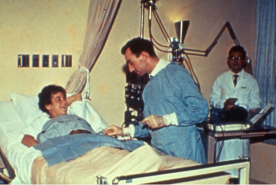February 25, 2025
Access to kidney transplants isn't always fair—especially for Black/African American people facing systemic barriers to getting the care they need.
What if our health system didn't wait for people to overcome these barriers alone? What if the system helped people get a life-saving transplant?
That's the idea behind the System Interventions to Achieve Early and Equitable Transplants (STEPS) Study led by Dr. Ebony Boulware, Dean of Wake Forest School of Medicine University. Dr. Boulware is a leader in health equity and kidney research. She's working to change how healthcare systems support patients, so everyone has a fair chance at transplantation.
Keep reading to find out how.
Barriers to Kidney Transplantation
The STEPS Study examines four barriers to accessing kidney transplants. These roadblocks have disproportionately affected Black/African American people for decades:
- Kidney Disease Awareness: Many don't know they have kidney issues until it's too late.
- Education on Treatment Options: People with kidney failure aren't given the education they need to protect their kidneys or get a transplant.
- Referral Delays: Even when under the care of a nephrologist, some don't get a timely referral for transplant evaluation.
- Challenges Navigating the Transplant Process: Many struggle to complete the evaluation process once referred.
The risk of developing kidney failure is not due to race. It stems from social determinants of health (SDoH). These are medical, environmental, and social factors outside one's control. They include how someone is treated based on their race, religion, sexual orientation, or gender.
"SDoH could include having access to healthy food, housing, and consistent transportation. There are medical barriers like weight loss. Others don't understand the medical lingo," Dr. Boulware said. "Emotional support is another gap—many feel overwhelmed after a kidney disease diagnosis if they don't have coping resources."
Dr. Boulware has spent much of her career trying to understand why these disparities exist and how to overcome them.
"There are racial differences in the development of kidney disease and who is more likely to get a transplant," Boulware said. "I want to make sure everybody with kidney disease has an equal opportunity to get a kidney transplant."
That's where the STEPS Study comes into play.
A Systematic Approach to Equity
The STEPS Study is fixing gaps in care with a healthcare system-driven model. Instead of waiting for people to take charge of their care, the system actively brings them in.
"We're studying three health systems: Duke University, Geisinger Health, and the University of Mississippi Medical Center," Dr. Boulware explained. "We created an electronic registry that flags patients with advanced kidney disease in the health record. Physicians now see a note in the patient's chart asking to refer the patient to a nephrologist or for transplant evaluation."
This allows Dr. Boulware to identify how barriers might be different based on where people live.
For example: Is it harder for people in rural areas than urban areas to overcome these barriers?
NKF is here to support you regardless of your circumstances. Whether you're waiting for a transplant or considering becoming a donor, we offer resources to guide you every step of the way. Start your educational journey today.
Subscribe today!
Join the NKF Blog Newsletter
Get inspirational stories and kidney disease resources delivered to your inbox every month. You'll gain practical insights and expert advice to help you better understand and manage your kidney health no matter where you are on your kidney journey.
Personalized Support
Half of the participants in the study were also randomly assigned a social worker.
"The social worker invites them in for education and discussions about living donation," Dr. Boulware said. "They talk about barriers to kidney transplantation and how patients can overcome them."
Afterward, a transplant coordinator helps the patient navigate the transplant evaluation process.
"We want to know if those reached out to have higher rates of transplantation. We also want to know if more people sign up to become living donors," Dr. Boulware said. "We're specifically looking to see if this helps overcome the race disparities we see along the transplant journey."
Need help navigating the transplant system? NKF Cares: Patient Information Center can help. Call toll-free at 855.NKF.CARES (855.653.2273) or email nkfcares@kidney.org to get started.
Transforming Kidney Care
While the study ends in December 2025, Dr. Boulware is already optimistic about its impact.
"We've shown that it's possible to identify and track patients across different health systems using electronic health records. Even if the additional social work and coordinator outreach doesn't significantly improve outcomes, implementing the registry nationwide could still be a game-changer for equity in kidney care."
Dr. Boulware's vision doesn't stop with the study.
"If this intervention is successful, we want to roll it out across the country," Dr. Boulware said. "By standardizing care recommendations through health system alerts, we reduce the potential for individual biases and make equitable care more accessible to everyone."










